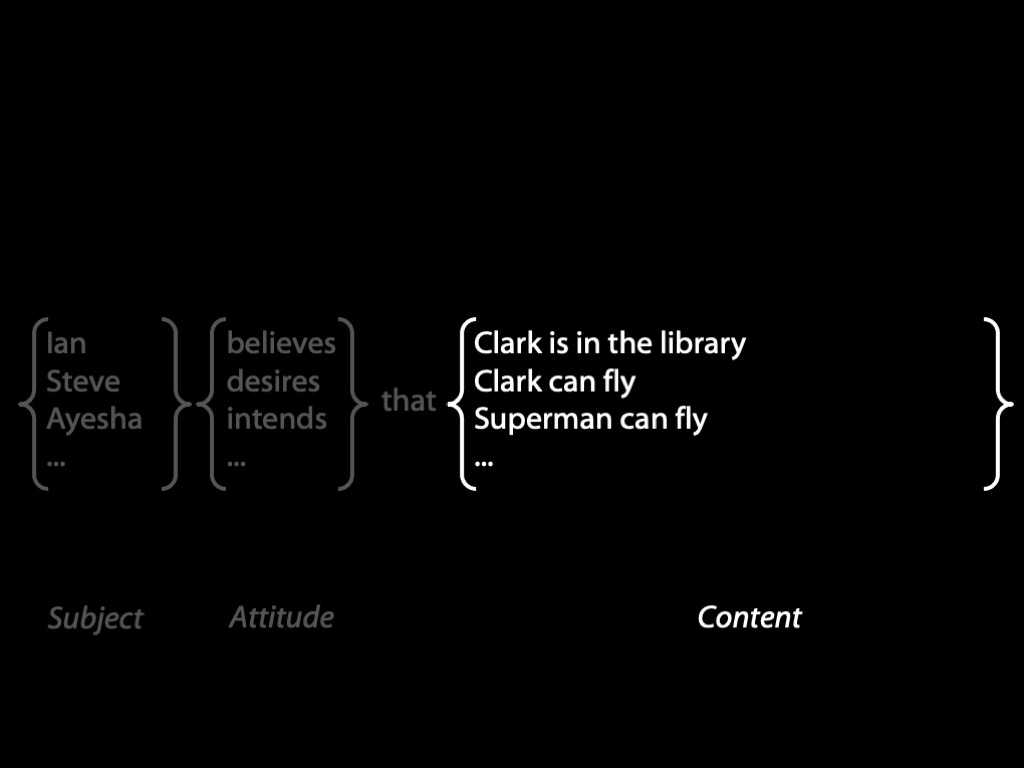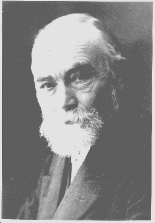Click here and press the right key for the next slide (or swipe left)
(This may not work on mobile or ipad. You can try using chrome or firefox, but even that may fail. Sorry.)
(If the slides don’t work, you can still use any direct links to recordings.)
also ...
Press the left key to go backwards (or swipe right)
Press n to toggle whether notes are shown (or add '?notes' to the url before the #)
Press m or double tap to slide thumbnails (menu)
Press ? at any time to show the keyboard shortcuts
todo
Start by linking this topic back to points of view.
End by tying in the topics: points of ivew, awareness, cognitive penetration & sense & reference.
Lecture 08:
Mind & Reality
\def \ititle {Lecture 08}
\def \isubtitle {Mind & Reality}
\begin{center}
{\Large
\textbf{\ititle}: \isubtitle
}
\iemail %
\end{center}
\section{Mental States}
/ex/TorF/qq/Belief is one kind of mental state|Mental states consist of a subject, an attitude and a content|The attitude of a belief is what makes it true or false

Sense and Reference: The Question
\section{Sense and Reference: The Question}

How could we distinguish contents?
--- By reference to the objects we are thinking about?
--- Then how?
Me: Henrix is the best guitarist.
You: Kevin Shields is the best guitarsit.

How could we distinguish contents?
--- By reference to the objects we are thinking about?
--- Then how?
Me: Henrix is the best guitarist.
You: Kevin Shields is the best guitarist.
1. Lois thinks Superman can fly
2. Superman is Clark
Therefore:
3. Lois thinks Clark can fly
Logically valid argument uses identity elimination.
If you said ‘Superman can fly’, Lois would agree.
Because she thinks Superman can fly.
If you said ‘Clark can fly’, Lois would disagree.
Because she thinks Clark cannot fly (and does not think that he can).
Therefore, Lois does not think Clark can fly.
This is not a valid inference; but it would be valid if could distinguish the
contents of thoughts just by reference to the things they are about;
therefore we cannot distinguish the
contents of thoughts just by reference to the things they are about.

How could we distinguish contents?
--- By reference to the objects we are thinking about?
--- Then how?
Me: Henrix is the best guitarist.
You: Kevin Shields is the best guitarist.
/ex/TorF/from/Superman can fly|Superman is Clark/to/Clark can fly/qq/the argument is valid
/ex/TorF/from/Lois thinks Superman can fly|Superman is Clark/to/Lois thinks Clark can fly/qq/the argument is valid|the argument would be valid if could distinguish the contents of thoughts just by reference to the things they are about
\section{Sense: Frege’s Story}
\emph{Reading:} §Frege, G. (1892 [1993]). On sense and reference. In Moore, A. W., editor, Meaning and Reference, pages 23–42. Oxford University Press, Oxford., §Section 3.1.1 and the first paragraph of Section 3.2 of Zalta, Edward N., "Gottlob Frege", The Stanford Encyclopedia of Philosophy, Edward N. Zalta (ed.)

How could we distinguish contents?
--- By reference to the objects we are thinking about?
--- Then how?
Me: Henrix is the best guitarist.
You: Kevin Shields is the best guitarist.
Frege ‘was, at least at the end of his life, a virulent racist,
specifically, an anti-Semite.
[...] bitterly opposed to the parliamentary
system, democrats, liberals, Catholics, the French and, above all,
Jews, who he thought ought to be deprived of political rights and,
preferably, expelled from Germany.
Dummett, Frege: Philosophy of Language

This repeats something we’ve already done but in Frege’s words.
When Frege was writing, he didn’t know about superman (it hadn’t been created yet).
So instead he focussed on a film called ‘The Long Kiss Goodnight’.

Samantha Caine
Suburban homemaker and the ideal mom to her 8 year old daughter Caitlin. She lives in a New England small town, teaches in a local school and makes the best Rice Krispie treats in town.
Charly Baltimore
a highly trained secret agent and cold-blooded killer involved in the government's most unscrupulous affairs.
Saying this doesn’t wreck the film for you.
Saying this does wreck the film for you.

‘What is stated in the proposition ‘Charly is Samantha’ is certainly not the same thing as the content of the proposition ‘Charly is Charly’.
(There’s a unit on propositions)
Now if what corresponded to the name ‘Samantha’ as part of the thought proposition was the reference of the name and hence the woman herself, then this would be the same in both thoughts propositions.
The thought proposition expressed in ‘Charly is Samantha’ would have to coincide with the one in ‘Charly is Charly’, which is far from being the case’
\citep[p.~44]{Frege:1892uq}.
Frege, 1892[1993] p. 44
Where have you seen essentially the same point before?
Anything unclear?
You’re gonna be writing an article on this.

Charly Baltimore lives in New England
Samantha Caine lives in New England
‘Someone who takes the latter to be true need not … take the former to be true
‘An object can be determined thought of in different ways, and every one of these ways of determining thinking of it can give rise to a special name, and these different names have different senses’
‘for it is not self-evident that it is the same object which is being determined thought of in different ways’
\citep[p.~44]{Frege:1892uq}.
Frege, 1892[1993] p. 44
What are senses?
Good question. Stay tuned ...
\section{What Are Senses?}
\emph{Reading:} §Evans, G. (1981 [1985]). Understanding demonstratives. In McDowell, J., editor, Collected Papers, page 411. Clarendon Press, Oxford., §Campbell, J. (2011). Visual Attention and the Epistemic Role of Consciousness. In Mole, C., Smithies, D., and Wu, W., editors, Attention: Philosophical and Psychological Essays, page 323. Oxford University Press.
What are senses? Answer 1
I’ll give you three answers ...
Contrast the proposition
Charly is Charly
with the proposition
Charly is Samantha.
ftbe: These may differ in informativeness.
Terminology: let ‘sense’ be whatever attribute of propositions (or their components) explains the difference.
observation: There could be no such difference if the sense in question were Charly herself.
conclusion: sense is not the thing the thought is about.
What are senses? Answer 2
This is offered as an intuitive gesture towards an answer ...
‘Frege’s idea was that to understand [a thought about a thing], one must not merely think of
the [thing] that it is the [thing],
but that one must, in so thinking,
think of the [thing] in a particular way.
The way in which one must think of the [thing] in order
to understand [the thought] is [...] sense’
\citep[p.~294]{Evans:1985gj}
Evans, 1981 [1985]: 294
What are senses? (Answer 2)
A sense is a way of thinking about an object.
What are senses? Answer 3
‘all that anyone has been able to think of is that different [senses]
are a matter of
different descriptions being associated with the signs.
Some other views have been tried ... But these ideas have not been found compelling’
Campbell, 2011 p. 340
I wish someone had told me this before.
I have the sense that the answer was out there and I could not find it.
‘all that anyone has been able to think of is that different modes of presentation [i.e. senses]
are a matter of
different descriptions being associated with the signs. Some other views have been tried,
such as those that say all uses of co-referential terms in a single discourse must be anaphorically
linked. But these ideas have not been found compelling’ \citep[p.~340]{campbell:2011_visual}.
This fits with how the stories were introduced
Samantha Caine
Suburban homemaker and the ideal mom to her 8 year old daughter Caitlin. She lives in a New England small town, teaches in a local school and makes the best Rice Krispie treats in town.

Charly Baltimore
a highly trained secret agent and cold-blooded killer involved in the government's most unscrupulous affairs.
The sense involved when I think about Charly Baltimore is this description:
the highly trained secret agent suffering from amnesia.
The sense involved when I think about Samantha Caine is this description:
the New England teacher with an 8 year old daughter who makes the best Rice Krispie treats in town.
Contrast the proposition
Charly is Charly
with the proposition
Charly is Samantha.
ftbe: These may differ in informativeness.
Terminology: let ‘sense’ be whatever attribute of propositions (or their components) explains the difference.
So if senses are descriptions and if sense are what you know when you have
knowledge of reference, can we explain the difference in informativeness?
Charly Baltimore lives in New England
Samantha Caine lives in New England
‘Someone who takes the latter to be true need not … take the former to be true
The highly trained secret agent suffering from amnesia lives in New England.
The New England teacher with an 8 year old daughter who makes the best Rice Krispie treats in town.
In summary ...
What are senses?
whatever attribute of propositions (or their components) explains the difference in informativeness between propositions concerning the same object and property.
ways of thinking about objects.
descriptions of objects (??)
/ex/TorF/qq/Sense is whatever attribute of propositions (or their components) explains the difference in informativeness between propositions concerning the same object and property.|Senses are ways of thinking about objects.|Senses might be descriptions of objects.
\section{Sense: Interim Conclusion}

conclusion
In conclusion, ...
Contrasts in informativeness (Charly is Charly vs Charly is Samantha)
Contrasts in attitude (Charly is in New England vs Samantha is in New England)
Sense is whatever it is that explains these facts.
















